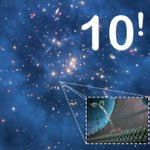Take Cantor's Dilemma (the novel). A real page turner. As it so happens, it deals a lot with reproducibility of a scientific experiment. Sounds familiar, when you deal with scientific workflows, their automation and reusability. So there's one link to some of my other interests. Or how about this: Cantor's Dilemma (the paperback) was lying on top of "A Different Universe" by Robert B. Laughlin, a Nobel laureate in Physics from Stanford. On May 22nd this year he gave a lecture at UCD. Surprisingly few people showed up (I suspect absence of PR/advertisement was at least a contributing factor). He gave an interesting talk with (too?) little physics in it. Anyways, I bought the book and asked the famous author to sign it. In his talk, Laughlin mentioned how getting the Nobel wasn't such a big deal after all (lots of eating he mentioned). He also mentioned in his talk (and his book, Chapter 7) a trip to the Neckar valley in honour of the 60th birthday of Klaus von Klitzing, Nobel laureate of 1983. After the talk, while having the book signed, I chatted briefly with Laughlin about the Neckar valley -- which happens to be where I was born.
So Djerassi's book was lying on top of Laughlin's; I had started the latter first, but finished the former sooner.. (eh? Yes.) But there's another connection: Djerassi describes in his novel quite a bit of detail what's going on at the Nobel festivities. This is a nice connection I think -- a novel by a scientist about some interesting happenings surrounding a (fictious) Nobel prize for cancer tumorgenesis; and real Nobel's book on "reinventing physics from the bottom down".
It's a small world indeed. And don't me get started on musing where all that life came from ... or those atoms for that matter...
